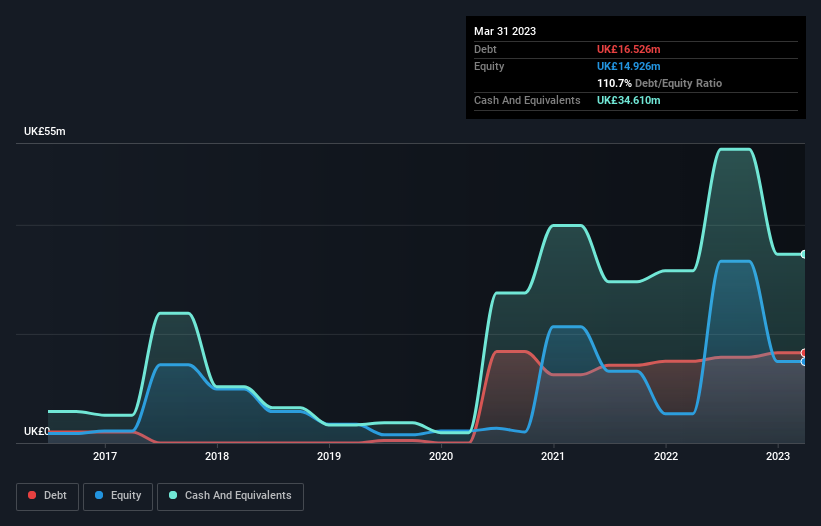
Warren Buffett famously said, 'Volatility is far from synonymous with risk.' When we think about how risky a company is, we always like to look at its use of debt, since debt overload can lead to ruin. We can see that Redx Pharma Plc (LON:REDX) does use debt in its business. But should shareholders be worried about its use of debt?
Why Does Debt Bring Risk?
Debt is a tool to help businesses grow, but if a business is incapable of paying off its lenders, then it exists at their mercy. In the worst case scenario, a company can go bankrupt if it cannot pay its creditors. However, a more common (but still painful) scenario is that it has to raise new equity capital at a low price, thus permanently diluting shareholders. Of course, debt can be an important tool in businesses, particularly capital heavy businesses. When we examine debt levels, we first consider both cash and debt levels, together.
View our latest analysis for Redx Pharma
How Much Debt Does Redx Pharma Carry?
The image below, which you can click on for greater detail, shows that at March 2023 Redx Pharma had debt of UK£16.5m, up from UK£15.0m in one year. But it also has UK£34.6m in cash to offset that, meaning it has UK£18.1m net cash.

How Healthy Is Redx Pharma's Balance Sheet?
According to the last reported balance sheet, Redx Pharma had liabilities of UK£26.3m due within 12 months, and liabilities of UK£1.62m due beyond 12 months. Offsetting these obligations, it had cash of UK£34.6m as well as receivables valued at UK£5.47m due within 12 months. So it can boast UK£12.2m more liquid assets than total liabilities.
This short term liquidity is a sign that Redx Pharma could probably pay off its debt with ease, as its balance sheet is far from stretched. Simply put, the fact that Redx Pharma has more cash than debt is arguably a good indication that it can manage its debt safely. There's no doubt that we learn most about debt from the balance sheet. But ultimately the future profitability of the business will decide if Redx Pharma can strengthen its balance sheet over time. So if you're focused on the future you can check out this free report showing analyst profit forecasts.
Over 12 months, Redx Pharma made a loss at the EBIT level, and saw its revenue drop to UK£13m, which is a fall of 22%. To be frank that doesn't bode well.
So How Risky Is Redx Pharma?
Statistically speaking companies that lose money are riskier than those that make money. And we do note that Redx Pharma had an earnings before interest and tax (EBIT) loss, over the last year. And over the same period it saw negative free cash outflow of UK£30m and booked a UK£29m accounting loss. With only UK£18.1m on the balance sheet, it would appear that its going to need to raise capital again soon. Overall, its balance sheet doesn't seem overly risky, at the moment, but we're always cautious until we see the positive free cash flow. The balance sheet is clearly the area to focus on when you are analysing debt. But ultimately, every company can contain risks that exist outside of the balance sheet. For example Redx Pharma has 3 warning signs (and 2 which shouldn't be ignored) we think you should know about.
If you're interested in investing in businesses that can grow profits without the burden of debt, then check out this free list of growing businesses that have net cash on the balance sheet.
If you're looking to trade Redx Pharma, open an account with the lowest-cost platform trusted by professionals, Interactive Brokers.
With clients in over 200 countries and territories, and access to 160 markets, IBKR lets you trade stocks, options, futures, forex, bonds and funds from a single integrated account.
Enjoy no hidden fees, no account minimums, and FX conversion rates as low as 0.03%, far better than what most brokers offer.
Sponsored ContentNew: AI Stock Screener & Alerts
Our new AI Stock Screener scans the market every day to uncover opportunities.
• Dividend Powerhouses (3%+ Yield)
• Undervalued Small Caps with Insider Buying
• High growth Tech and AI Companies
Or build your own from over 50 metrics.
Have feedback on this article? Concerned about the content? Get in touch with us directly. Alternatively, email editorial-team (at) simplywallst.com.
This article by Simply Wall St is general in nature. We provide commentary based on historical data and analyst forecasts only using an unbiased methodology and our articles are not intended to be financial advice. It does not constitute a recommendation to buy or sell any stock, and does not take account of your objectives, or your financial situation. We aim to bring you long-term focused analysis driven by fundamental data. Note that our analysis may not factor in the latest price-sensitive company announcements or qualitative material. Simply Wall St has no position in any stocks mentioned.
About AIM:REDX
Redx Pharma
Engages in drug discovery, pre-clinical development, and licensing activities in the United Kingdom.
Excellent balance sheet with weak fundamentals.


